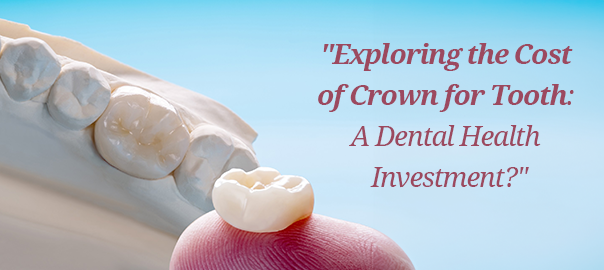
Cost of Dental Crown Placed in Implants in India
Curious about the real cost of getting a dental crown on an implant in India? You’re not the only one. Dental treatments can be a handful—not just the process but the expenses too. We’ll explore the factors shaping the cost of a dental crown on implants, why it fluctuates, and guide you to make the best decision for your dental care.
At Clove, we aren’t just about the short-term solution. We guide you to choose wisely to guard and maintain your grin, promising benefits that last longer than the instant treatment.
Understanding Dental Crowns
A dental crown, or so commonly referred to as a tooth cap, is a customised cover that is placed over a tooth. This covering helps to restore the tooth’s shape, size and strength. The aim for placing a cap is to protect the weak teeth & restore the broken ones. Post RCTs the tooth becomes weakened and is prone to fracture upon application of force and pressure. The placement of a cap helps restore function & aesthetics thus offering long-term protection and support for damaged teeth.
Types of Dental Crowns
Dental technology offers a range of dental cap materials to suit one’s requirements:
Porcelain Crowns:
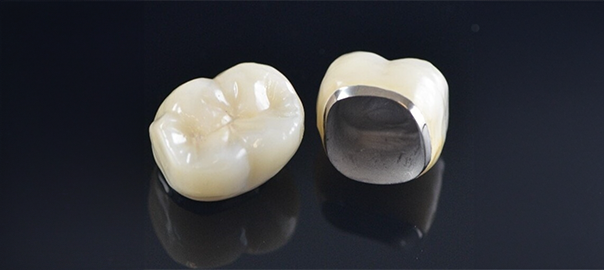
Teeth cap, made from porcelain, are a handy solution to fix and fortify impaired teeth. Their ceramic make resembles the look of authentic teeth—similar to natural tooth enamel. This makes them popular, not only for aesthetic purposes but for practical ones too.
Metal Crowns:
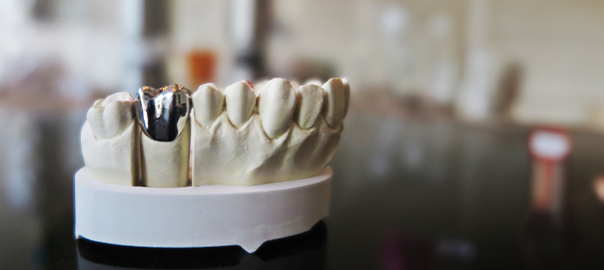
Dental repair often uses metal teeth caps. They’re crafted from strong metals like gold or chromium. Their robust nature suits them well. Especially for molars and premolars, you know, the teeth that do all the hard grinding.
Ceramic Crowns:
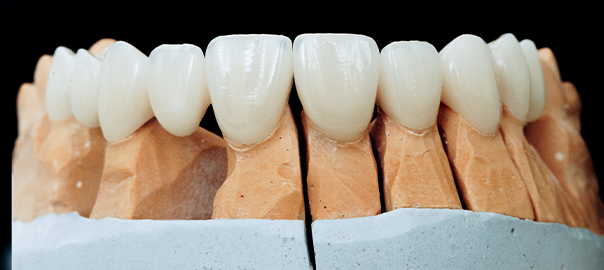
People often pick ceramic teeth cap or to some known as porcelain crowns, for their tooth fix-ups. Why? They match the look and strength of your real teeth. Made of a special ceramic, they’re the same color and see-through just like the teeth you were born with.
Porcelain-Fused-to-Metal (PFM) Crowns:
PFM dental cap are sturdy, made of metal but pretty to look at, with a porcelain coat. Metal gives strength, while porcelain fits in naturally in the mouth. They’re great for fixing damaged teeth.
In addition to their standard application, dental crowns are crucial in restorations that use implants. Wondering how? Continue reading to discover.
Dental Crowns on Implants
What Are Implant-Supported Crowns?
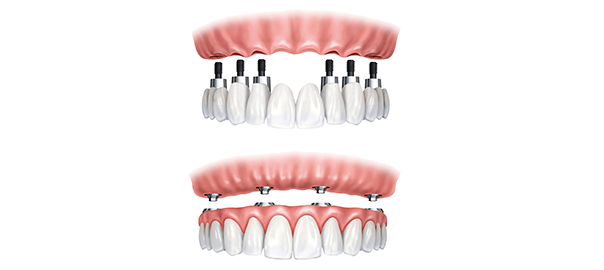
Implant-supported crowns are crowns designed to attach to dental implants. These implants act like anchors for the new faux tooth, hunkering down into your jawbone. Once the implant is in place, a crown is plopped on top. This crown becomes the new tooth, making it look and work pretty much like a regular tooth.
This combination has not only restored your smile but also ensured stability and future bone loss prevention.
Do you know what is the Dental Caps cost in India?
The teeth cap price in India depends on the material used:
Several crucial factors can impact the overall cost of your dental crown:
| Type of Crown | Cost Range (₹) | Features |
|---|---|---|
| Porcelain-Fused-to-Metal | 4,690 – 6,390 | Durable and natural-looking |
| Metal | 3,490 – 6,490 | Highly durable but less aesthetic |
| Zirconia | 8,190 – 13,300 | Strong and visually appealing |
| Crowns on Implants | ₹7,790 – ₹9,890 | Unparalleled longevity and value |
Material Quality:
Different materials offer various benefits and come at different price points. Porcelain might provide better aesthetics, while metal crowns offer superior durability.
Dentist’s Expertise:
More experienced dental professionals might charge higher fees, but they also bring a level of precision and skill that can ensure better long-term results.
Geographical Location:
Dental costs can vary depending on your city or region, with metropolitan areas typically having higher prices compared to smaller towns.
Procedure Complexity:
The condition of your tooth, additional treatments required, and the extent of restoration will influence the final cost.
Advantages of Crowns on Implants
- Long-Lasting Durability
- Preservation of Jawbone Health
- Natural Appearance
- Improved Functionality
What to Choose & When?
Both crowns and implant-supported crowns are designed for different purposes. Depending upon your dental health needs and goals, here’s a quick guideline to help you choose:
| Dental Crowns (Natural Teeth) | Implant-Supported Crowns | |
|---|---|---|
| Best For: | Damaged Decayed Discolored teeth |
Replacing one or more missing teeth |
| Durability: | 5-15 years with proper care, depending on the material used. | Designed to last decades, with the implant acting as a permanent root replacement. |
| Aesthetics: | Provides natural-looking results | Matches natural teeth seamlessly |
| Functionality: | Restores chewing and appearance, but underlying tooth may remain susceptible to decay or sensitivity. | Fully restores function without risk of decay, and the implant provides stable support. |
| Jawbone Health: | Does not address bone loss in areas where teeth are missing. | Prevents jawbone loss by stimulating bone tissue, similar to a natural tooth root. |
Long-Term Benefits of Dental Crowns
- Tooth decay can be halted and further damage avoided with the aid of crowns, to protect the structure beneath.
- Custom coloured porcelain crowns imitate the features of your own teeth for a smile boost.
- Such a lovely smile has the potential to skyrocket your confidence. Crowns can give your chewing abilities a big upgrade, improving your life greatly.
- Dental crowns, with good upkeep, can last for numerous years, acting as a long-term solution for all your oral health needs.
- Investing in dental crowns means you’re not only fixing a tooth; you’re also prioritizing your overall oral health and wellness.
What are Potential Risks and Maintenance for Implant-supported crowns
Care Tips
- Regular brushing
- Flossing
- Avoiding extremely hard foods
- Regular dental check-ups
Potential Complications
- Temporary tooth sensitivity
- Potential crown replacement after 5-15 years
- Risk of underlying tooth decay
Potential Risks of Implant-Supported Crowns
Implant-Related Infection: If cleanliness around the implant isn’t kept up, there might be an infection, like with natural teeth. This problem can result in inflamed gums, bone loss, or even implant failure if not treated.
Wear and Tear of Crowns: Crowns on teeth are made strong, yet they’re not unbreakable. Chomping on hard items like ice, nuts, or pens might cause breakages over time.
Risk of Implant Failure: It’s uncommon but an implant has a chance to fail. This could happen if it isn’t correctly fused with the jawbone (osseointegration). Smoking, poor mouth cleaning, or health problems like diabetes can up this chance.
Crown Alignment: If the crown isn’t aligned right, this can cause discomfort or uneven wear on the other teeth. That’s why, post-placement, regular dental visits are vital.
Nerve or Sinus Problems: Sometimes the implant is put too close to a nerve or sinus space, causing discomfort or sensitivity. With careful planning before surgery, this risk can be lessened.
Maintenance Tips for Implant-Supported Crowns
- Keep your mouth clean: Use a soft toothbrush and toothpaste with fluoride twice a day. Clean around the posting of the implant with a special brush or a water flosser.
- See your dentist often: Go to your dentist every six months or when they suggest. This way, they can keep an eye on the fake tooth and implant to stop any problems before they’re serious.
- Wear a Night Guard if needed: Grinding your teeth when you sleep, known as bruxism, can wear down the crown of your implant. A night guard, made just for you, can protect it.
- Don’t eat hard or sticky things: The false tooth held in place by your implant is tough but chewing hard candies, bits of popcorn, or sticky sweets could hurt it over time.
- Stop smoking: Smoking slows down healing. It can cause your implant to fail. If you smoke, think about quitting to keep your dental implant safe.
- Watch for problems: If you feel pain, see swelling or your crown gets lose, call your dentist right away. It’s better to tackle small problems early rather than big ones later.
Key Takeaway:
A dental crown isn’t just another expense. Think of it as a protective shield for your teeth. Our oral health deserves more attention than we give it. Each tooth matters, and fixing one today could prevent major problems tomorrow.
Small investments now can save big expenses later. Dental crowns might look costly at first glance. But compare that to repeated treatments or losing a tooth completely. This isn’t just about fixing a problem. It’s about protecting your ability to eat, speak, and smile with confidence.
Dental health connects deeply with overall wellness. One damaged tooth can change everything. It impacts how you eat, how you feel, and even your general health. Taking early care of teeth means taking care of your entire body.
We’ve shared insights about dental crowns in this blog. But knowledge isn’t enough. The real step forward is talking to a professional dentist. Remember, every mouth tells a different story. Only an expert can guide you perfectly. To get personalised advice, visit your nearest Clove Dental today!
Here’s the simple truth: preventive care saves more than money. It saves your comfort, your confidence, and your smile. Invest in your teeth today for a healthier tomorrow.
Frequently Asked Questions About Tooth Caps, Dental Crowns, and Implants
1. How long does a toothcap last?
Typically a tooth cap survives 5 to 15 years. The lifespan depends upon the chosen material and how well you take care of your oral hygiene.
2. What’s the cost of a tooth cap in India?
Prices vary based on the type:
Metal crowns: ₹3,490 – ₹6,490
Porcelain-fused-to-metal crowns: ₹4,690 – ₹6,390
Zirconia crowns: ₹8,190 – ₹13,300
3. Is capping a tooth a good idea?
Absolutely! A tooth cap protects your tooth from further damage, brings back its original function, and makes it look better.
4. Does getting a tooth cap hurt?
Not really. Dentists use local anesthesia, so the procedure is pain-free. You might feel slight sensitivity afterward, but it’s temporary.
5. Are dental crowns permanent?
No, but they’re long-lasting. With proper care, they can support your tooth for many years.
6. What types of dental crowns exist?
The main types include:
– Metal crowns
– Porcelain-fused-to-metal crowns
– Zirconia or ceramic crowns
7. What’s the cost of a single tooth implant in India?
Typically, a single tooth implant ranges from ₹29,400 to ₹60,300. Prices depend on location and the dentist’s expertise.
8. How long do dental implants last?
With good care, dental implants can last 20 years or more. Some even last a lifetime!
9. Implant or bridge – which is better?
Dental implants are the long-term solution. They preserve jawbone health, while bridges are more affordable but might need replacement sooner.
10. Are dental implants painful?
The procedure uses local anesthesia. Any post-treatment discomfort can be managed with pain relievers.
11. What do artificial teeth cost in India?
Prices vary:
Dentures: ₹10,000 – ₹50,000
Dental implants: ₹29,400 – ₹60,300 per tooth
12. What are permanent artificial teeth called?
They’re typically known as dental implants or implant-supported crowns.
13. Can a dental crown fall off, and what should you do if it happens?
Yes, a dental crown can occasionally become loose or fall off due to wear, poor fit, or damage to the adhesive. If this happens:
– Preserve the crown: Keep the crown safe to show your dentist.
– Protect your tooth: Avoid chewing on the exposed tooth and use dental cement or toothpaste as a temporary adhesive if necessary.
– Visit your dentist: Schedule an appointment immediately to re-cement or replace the crown.
Leave a Reply
Leave a Reply
Explore More Similar Posts
Explore More Blogs


Leave a Reply